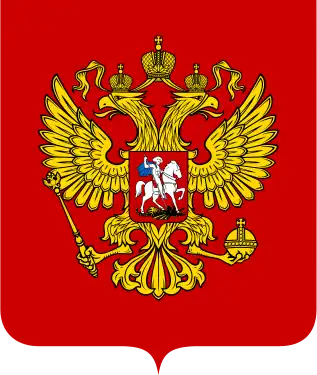Argentina–Russia relations
Current and historical relations between the Argentine Republic and the Russian Federation have existed for decades. Both nations are members of the G20, United Nations and the country is a potential new member of the BRICS grouping which includes Brazil, Russia, India, China and South Africa
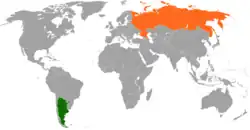 | |
Argentina |
Russia |
|---|---|
History
In 1866, Russia opened a consulate in Buenos Aires. Diplomatic relations between Argentina and Russia were established on 22 October 1885.[1] Most Russian migrants arrived to Argentina between 1880 and 1921, in three waves. The first wave was caused by events such as the 1905 Russian Revolution; the second wave from the October Revolution of 1917 and the third wave caused by the Russian Revolution that took place between 1917 and 1922.[2] In October 1917, Argentina suspended diplomatic relations with Russia as a result of its revolution. Diplomatic relations were restored with the Soviet Union soon after World War II in 1946.[1]
According to Russian historian Briliov, USSR assisted Argentina in Falklands War with satellite survillence of the British fleet, which helped in the sinking of HMS Coventry.[3] In 1986, Argentine President, Raúl Alfonsín, paid an official visit to Moscow, the first by an Argentine head-of-state.[4] In December 1991, Argentina recognized the Russian Federation as the successor state of the USSR.[1] In April 2010, Russian President, Dmitry Medvedev, became the first Russian head-of-state to visit Argentina.[5]
On 24 October 2018, a videoconference was organized between the Friendship Groups of the upper houses of the Russian and Argentine Parliaments. The delegations of the Federation Council and the State Duma took part in the Parliamentary Forum and the Summit of the Presidents of the Group of 20 Parliaments and held bilateral meetings with members of the Argentine Parliament. On 18 June 2019, a second videoconference was held dedicated to the problems of deepening economic integration between Mercosur and the Eurasian Economic Union on the basis of the Memorandum of Understanding signed in December 2018.[1]
Each year, Argentines participate in international law enforcement events held in Russia.[1] From November 2017 to April 2018, the Argentine and Russian military specialists carried out a joint search for the missing Argentine submarine ARA San Juan (S-42) with 44 crew members on board.[1]
Invasion of Ukraine
In February 2023, the Argentine foreign ministry said in a statement "Argentina reaffirms its commitment to the principles of sovereignty and territorial integrity of states and human rights, permanent pillars of our country's foreign policy, it rejects the use of force as a mechanism to resolve conflicts and, in this way, reiterates its condemnation of Russia's invasion of Ukrainian territory."[6]
In February 2023, it was reported that Argentine immigration authorities were cracking down on pregnant Russian women who since the invasion of Ukraine have started travelling to Buenos Aires to give birth in order to gain Argentine citizenship for their children. Some 10,500 pregnant Russians have arrived in Argentina in the past year, with about 7,000 women returning home after giving birth.[7][8] The head of Argentina's immigration office said on Twitter that "mafia organizations were profiting by offering packages to obtain our passport to people who do not actually want to reside in our country."[9]
High-level visits

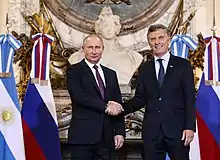
High-level visits from Argentina to Russia
- Foreign Minister Dante Caputo (1986)
- President Raúl Alfonsín (1986)
- President Carlos Menem (1990, 1998)
- Foreign Minister Guido di Tella (1994)
- Foreign Minister Adalberto Rodríguez Giavarini (2000)
- Foreign Minister Rafael Bielsa (2004)
- Foreign Minister Jorge Taiana (2006, 2008)
- President Cristina Fernández de Kirchner (2008, 2013, 2015)
- Foreign Minister Héctor Timerman (2011, 2014)
- Foreign Minister Susana Malcorra (2016)
- Foreign Minister Jorge Faurie (2017)
- President Mauricio Macri (2018)
- President Alberto Fernández (2022)
High-level visits from Russia to Argentina
- Foreign Minister Igor Ivanov (1997, 2003)
- Foreign Minister Sergey Lavrov (2006, 2013)
- President Dmitry Medvedev (2010)
- President Vladimir Putin (2014, 2018)
Bilateral agreements
Both nations have signed several bilateral agreements such as an Agreement on Maritime Transport (1974); Agreement to Eliminate Double Taxation in the field of International Maritime and Air Transport (1979); Agreement on Cooperation to Combat Abuse of Illicit Production and Trafficking of Narcotic Drugs (1990); Agreement on Judicial Assistance in Civil Matters (2000); Agreement on technical military cooperation (2004); Agreement on the removal of visa requirements for citizens of both nations (2009); Agreement on mutual legal assistance in criminal matters (2014); Extradition treaty (2014); Agreement on transfer of convicted persons for the completion of criminal sentences (2014); Agreement of cooperation on the peaceful uses of nuclear energy (2014); and an Agreement on the mutual protection of secret information in the field of technical-military cooperation (2015).[1][10]
Resident diplomatic missions
- Argentina has an embassy in Moscow.[11]
- Russia has an embassy in Buenos Aires.[12]
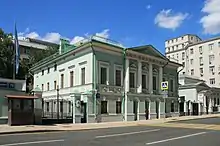 Embassy of Argentina in Moscow
Embassy of Argentina in Moscow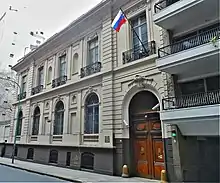 Embassy of Russia in Buenos Aires
Embassy of Russia in Buenos Aires
References
- Las Relaciones entre la Federación de Rusia y la República Argentina (in Spanish)
- Historia de la colectividad (in Spanish)
- Noguera, Jaime (2017-10-09). "The secret story of how Soviet satellites helped sink British warships in the South Atlantic". www.rbth.com. Retrieved 2020-09-08.
- Raúl Alfonsín sera el primer presidente argentino que visite la URSS (in Spanish)
- "Dmitry Medvedev met with President of Argentina Cristina Fernandez de Kirchner". Archived from the original on 2020-08-03. Retrieved 2020-07-24.
- "Back and forth: Argentina's changing rhetoric on Russia's war in Ukraine". Buenos Aires Times. 2023-02-23. Retrieved 2023-02-27.
- Uki Goñi (2023-02-11). "Crackdown on 'birth tourism' as pregnant Russians flock to Argentina". The Guardian. Retrieved 2023-02-27.
- Philippe Bernes-Lasserre and Nina Negron (2023-02-17). "Passports and War Driving Pregnant Russians to Give Birth in Argentina". Moscow Times. Retrieved 2023-02-27.
- "Argentina says mafia groups are spurring Russian birth tourism". Reuters. 2023-02-13. Retrieved 2023-02-27.
- Acuerdos entre Rusia y Argentina (in Spanish)
- Embassy of Argentina in Moscow
- Embassy of Russia in Buenos Aires

